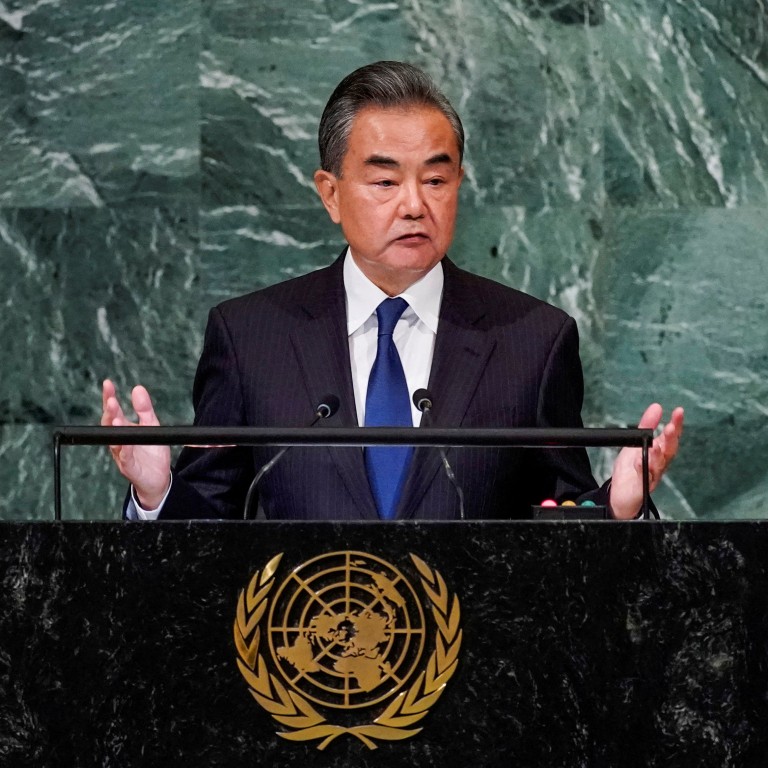Instead Wang spoke at length about
Taiwan, warning the international community against any erosion in the self-ruled island’s status as an “inseparable” part of China. Beijing sees Taiwan as a renegade province to be brought under its control, by force if necessary.
“Only when China is completely reunified can there be enduring peace across the Taiwan Strait,” the career diplomat said. “Any move to obstruct China’s reunification is bound to be crushed by the wheels of history.”
Most countries do not view Taiwan as an independent state, including the US. But Washington supports its military defence as well as its expanded presence in global health,
crime and
aviation – objectives Beijing opposes.
Beijing has avoided criticising Moscow over the invasion while refraining from extending military support to its
“no-limits” strategic partner.
On Thursday,
Nato Secretary General Jens Stoltenberg told Wang that China should use its influence to end the war. He also said China’s ambitions and “coercive policies” challenged the interests, security and values of Nato allies.
Wang’s speech on Saturday repeatedly criticised Washington without mentioning the US by name, making references to protectionism, decoupling, bloc confrontation and arbitrarily imposed sanctions.
“The difference in systems should not be used as an excuse to create division” Wang said, nor should “democracy and
human rights be used as tools or weapons to achieve political ends”.
Analysts said Biden seemed more pointed this week in explicitly addressing US-China competition than during last year’s general assembly. “Biden’s main focus was of course Russia, but he did seem keen to throw in a few good sideswipes at China,” said Richard Gowan, UN director of the International Crisis Group, a think tank.
“Although this is in line with the overall deterioration in the
Sino-American relationship, it was still notable that the US president chose to be so frank about the two powers’ differences in front of other UN members,” Gowan added.
China’s foreign minister went on to describe China’s growing role on the global stage, its quest for more open trade, and efforts to rewire international development through the Global Development Initiative, a still vaguely outlined plan announced at the UN a year ago by President
Xi Jinping to alleviate poverty.
The push dovetails with Beijing’s expanding overtures to developing countries as its popularity declines among wealthier nations. A Pew Research survey in June found unfavourable views of China had risen in nearly all of the 19 countries surveyed, with record highs tallied in several, including the US,
Canada,
Germany and
South Korea.
“The path that China pursues is one of peace and development, not plunder and colonialisation,” said Wang. “It is a path of willing cooperation, not zero-sum gain.”
Wang’s address comes in a year when the Chinese leader has opted not to address the UN body despite Beijing’s drive for a greater role in global leadership.
Xi only started travelling abroad earlier this month after a two-year hiatus tied to the
coronavirus pandemic and is preparing for the
party congress in mid-October when he is expected to gain an unprecedented third term.
But Beijing has less to showcase than it did last year, when Xi touted the Asian giant’s successful early fight against Covid-19, the centenary of
China’s Communist Party, and efforts to advance “democracy and rule of law in international relations” in a video address to the global body.
China struck a relatively low profile at this year’s general assembly unlike the previous two years when Xi spoke by video and shared some of the limelight with then-president
Donald Trump and Biden, said Gowan.
“This year, by contrast, [Xi] was notable by his absence” during the first all-in-person general assembly since the pandemic, Gowan added. “Wang Yi was present and prominent, but obviously lacks Xi’s overall clout.”
In contrast, the US this week put front and centre its strategy of working with partners and allies to check China’s growing military, economic and political muscle globally, which Beijing has rebuked as a
“cold war mentality”.
Also on Friday,
Aukus security pact members Australia,
Britain and the US said they had
made “significant progress” towards Canberra’s acquisition of a nuclear submarine, and the Wall Street Journal reported that negotiations on US construction of a first vessel were under way. China has
condemned the alliance as “extremely irresponsible” and a threat to regional peace.
Wang worked this week to counter the US, speaking to the Group of Friends Global Development Initiative, a Chinese-launched bid to bolster support among developing countries. He also called at the Asia Society for “win-win” cooperation between Beijing and Washington, and touted China’s “certain” opening up to US business groups.
But there were signs of strain as Putin
acknowledged Chinese “concerns” over Moscow’s faltering invasion of Ukraine and Wang told the Security Council on Thursday that Beijing placed importance on territorial integrity.



